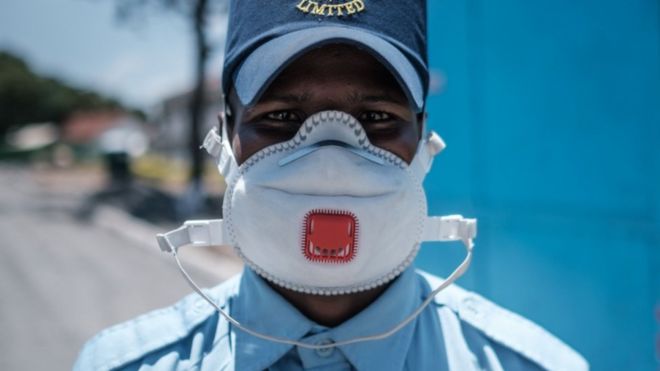Several African states have imposed far-reaching restrictions in a bid to curb the spread of coronavirus.
South Africa has announced a ban on travel from the worst-affected countries and has banned gatherings of more than 100, while Kenya has also imposed sweeping travel restrictions.
The measures are an attempt to prevent a major outbreak on a continent with poor health services.
At least 27 African states have so far been affected by the virus.
Liberia, where more than 4,800 died during the Ebola outbreak of 2014 and 2015, has become the latest African state to report a case of coronavirus.
The executive director of the state-run Environmental Protection Agency (EPA), Eugene Nagbe, tested positive after returning from Switzerland on Friday.
In total, more than 300 people have been diagnosed with the virus in Africa. Six deaths have been reported.
Most of the cases involve people arriving from Europe and North America.
But South Africa imposed the most severe restrictions on its citizens since the end of white-minority rule after reporting its first local transmission.
In an address to the nation on Sunday, President Cyril Ramaphosa declared a national disaster as the number of cases rose to 61.
"Initially, it was people who had travelled out of the country, especially from Italy, who had positively tested for the virus," he said.
"It is concerning that we are now dealing with internal transmission of the virus," Mr Ramaphosa said.
What else has South Africa done?
Mr Ramaphosa said he would chair a government command council that would "coordinate all aspects of our extraordinary emergency response".
Among the measures he announced are:
- The closure of nearly half - 35 out of 72 - of South Africa's land border crossings from Monday, along with two of its eight sea ports
- Banning foreign nationals from eight countries - including the UK and US - from entering South Africa from Wednesday
- Advising people to avoid domestic travel
- Shutting all schools with immediate effect until the end of the Easter holidays
- Banning all public gatherings of more than 100 with immediate effect. This forces the cancellation of the biggest annual event in South Africa - an Easter religious service attended by several million followers of the Zionist Christian Church at its headquarters in northern Limpopo province.
Latest Stories
-
William Amponsah earns All-American honours with NCAA win
17 minutes -
Opportunity International CEO Kwame Owusu-Boateng named ‘Male Personality of the Year’ at Ghana Executive Awards 2025
28 minutes -
The 8-Step process to buy a house in Ghana
34 minutes -
Governor explains economic gains
38 minutes -
Westec Security CEO Esther Boakye wins ‘Woman of Excellence Award’ at Ghana Executive Awards 2025
44 minutes -
Dome Kwabenya MP pushes for flood solutions after fatal downpour
49 minutes -
Ouattara anticipates tough battle as Hearts of Oak face Accra Lions
53 minutes -
NPP did the heavy lifting to stabilise economy – Amin Adam fires back at Isaac Adongo
54 minutes -
CAF launches new look Champions League trophy ahead of first leg of final
1 hour -
Kelvin Nii Kwatey Quartey crowned ‘Event Executive of the Year’ at Ghana Executive Awards 2025
1 hour -
ISRQ2025: Dansoman Cluster B settles score with Theorose School, storms into semifinals
1 hour -
Tekpetey wins Bulgarian Cup double with Ludogorets
2 hours -
Bomfeh cautions public against over-reliance on audio and video recordings in public discourse
2 hours -
Lawrence Baidoo: The African Schools Football Championship 2025 experience
2 hours -
Joint Police and National Security operatives storm Wontumi’s residence with search warrant
2 hours

